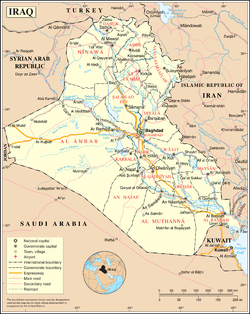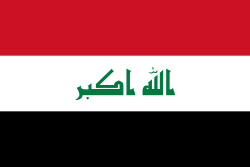

The following outline is provided as an overview of and topical guide to Iraq:
Contents
- General reference
- Geography of Iraq
- Environment of Iraq
- Regions of Iraq
- Demography of Iraq
- Government and politics of Iraq
- Branches of the government of Iraq
- Foreign relations of Iraq
- Law and order in Iraq
- Military of Iraq
- Local government in Iraq
- History of Iraq
- Culture of Iraq
- Art in Iraq
- Sport in Iraq
- Economy and infrastructure of Iraq
- Education in Iraq
- Health in Iraq
- See also
- References
- External links
Iraq – sovereign country located in Western Asia. [1] It spans most of the northwestern end of the Zagros mountain range, the eastern part of the Syrian Desert and the northern part of the Arabian Desert. [2] It shares borders with Kuwait and Saudi Arabia to the south, Jordan to the west, Syria to the northwest, Turkey to the north, and Iran to the east. It has a very narrow section of coastline at Umm Qasr on the Persian Gulf. There are two major flowing rivers: the Tigris and the Euphrates. These provide Iraq with agriculturally capable land and contrast with the desert landscape that covers most of Western Asia.





